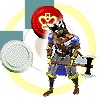|
 Are you tired of conquering the
same dungeons, knowing your computer’s every move, or beating up
on Pauline, Michele, and Ben in hearts? Then take your game online.
Are you tired of conquering the
same dungeons, knowing your computer’s every move, or beating up
on Pauline, Michele, and Ben in hearts? Then take your game online.
Just about any game you can think of now has an online component, so instead of competing alone against your computer, you
can interact and engage with real, human opponents from
around the world in online races, aerial battles, role-playing games,
and countless other contests—and Windows 98 will give you the competitive edge.
Windows 98 is your best weapon
Windows 98
supports the most advanced
gaming technologies, such as Accelerated Graphics Port (AGP) and
Multimedia Extensions (MMX). Plus, Internet Explorer 5 has built-in
DirectX
multi-media services to make online games faster, richer, and
more interactive; and to let you take advantage of the latest gaming
hardware.
Armed with all of this technology, you’re ready to put your
skills to the test. Here’s what you need to know to get started.
Latency? Ping? Lag? What does it all mean?
Online
gamers often discuss “latency,” which
is the time it takes for data to travel from one point on
the Internet to another. You may hear gamers refer to latency as
“ping" or "lag.” Your “ping rate” is a measure of the time (in
milliseconds) it takes for a signal to travel from your computer to
your opponent’s and back.
If you have a slow connection to the Internet, or if one
of the Internet gateways or servers between you and your
opponent is especially busy, you’ll experience high latency, and you
may see delays or disruption in your game. In addition to
choppy or jerky game play, you’ll be helpless against the attacks of
your opponent if he or she has lower latency than you. To avoid
getting trounced, you can take steps to ensure a good online gaming
experience and equal footing with your opponent when you go into
battle.
Get ready to rumble
The most important step in achieving
low latency is getting a fast connection to the Internet. A 56-Kbps
modem will work well, or better yet, get broadband
Internet access. Make sure that you have the most recent modem
drivers available from your modem's manufacturer (visit the
manufacturer’s Web site for more information), and find a reliable
Internet service provider.
Graphics-intensive games will work better if you optimize the
performance of your computer. Defragment
your hard disk regularly, and close any programs you don’t need
before you start a game, so there is nothing else draining power
from your computer.
The MSN Gaming
Zone
When you’re ready to start playing games on the Web, a great place to start is the MSN Gaming Zone, one of the most popular interactive
gaming destinations on the Internet for everyone from hardcore gamers
to card game players. You can choose from multi-player CD-ROM
games like Age of Empires, Rainbow Six, or Quake II; card games like spades, hearts, bridge, or cribbage; and board
games like backgammon, chess, reversi, and checkers. In addition, you’ll find:
-
Thousands of people playing at all times of
the day.
-
An active community of gamers communicating through chats, tutorial sessions,
and tournaments.
- Free matchmaking for popular CD-ROM games
to help you find and compete against other players.
- Original, multiplayer games designed specifically for the
Internet.
Play ball!
Click “Game Index” on the left side of the
Gaming Zone home page, and you’ll find a menu of all the games in the
Zone, sorted alphabetically. Each game page lists separate rooms
for that game under various categories, such as for beginning or
advanced players. Each room name has a number beside it showing how
many people are currently in the room.
Next to each player's name in a game room is
a latency indicator that shows how fast your current connection is
to that player. When you join a game, look for players with a green
latency indicator, which indicates low latency.
Once you
start playing, you'll
find an active community of players who will help you get started, learn
the lingo, and maybe even share their gaming secrets. While
you may be enemies in combat, you're sure to make new
friends. 

Mark Reed welcomes all challengers in online hearts.
|
Looking for
help in the Zone?
Microsoft Support’s MSN Gaming
Zone Troubleshooter can help with common issues and
problems.
More gaming help:
For other gaming issues, the MSN Computing Central Computer
Games Forum has information for
gamers, from help on troubleshooting a game installation, to tips on
the best 3-D card, to hints on beating a tough level.
|
